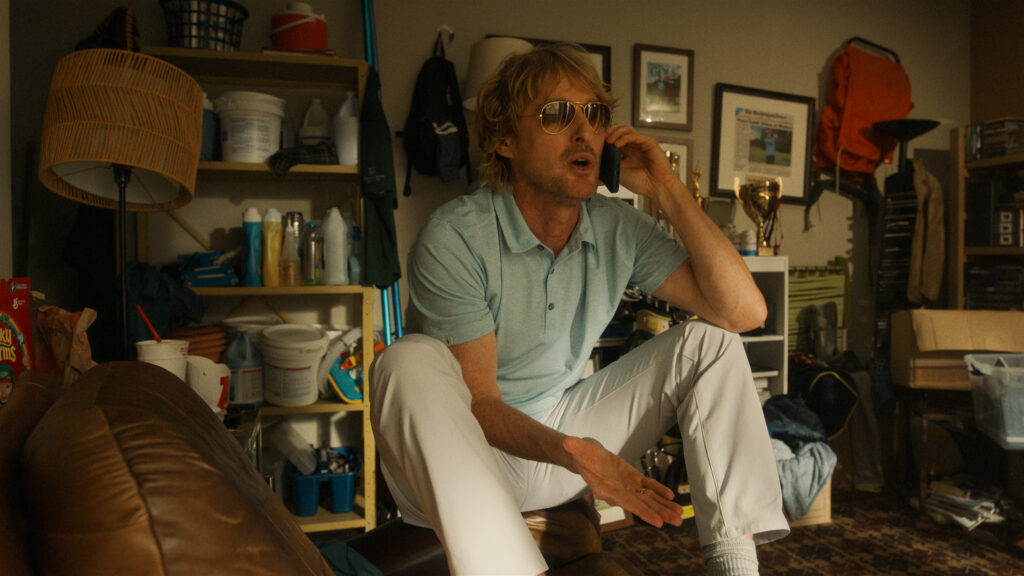In this first instalment of a new MH column by one of Australia’s most compelling television personalities and podcasters, Osher Günsberg reveals his strategies for quieting the insidious, negative self-talk that can drain the pleasure from your everyday life and fill you with doubt and self-loathing. The reward: a fresh start.
There is a radio station in my head that I sometimes can’t shut off.
I started my broadcasting career in radio, doing the overnight shift at an FM Station in Brisbane. For five years in the mid-’90s I turned on the microphone between Bryan Adams and Savage Garden songs to encourage people to keep listening after the 3:20am ad break because there was more Bryan Adams and Savage Garden on the way.
Whenever I spoke, I would need to say the positioning statement before I said anything else. It’s the thing the radio station does, and every radio station says it to define what they do almost every time they speak. “AM 788: More Talk, Less Sport…”; “99.6: Music your Mum loves…”; or “FM 109: Rock, Sport and the CheeseMan in
the morning…”
I’d take any of those stations over the noise I can pick up on my own internal channel. It’s a station in my head with a distinct callsign, like KIIS in Sydney or K ROCK in Geelong.
It’s “KFUK FM: All Negative Self Talk – ALL THE TIME”.
You may have heard it? It’s the station you hear after you leave a first date, or a job interview, or when you trip over getting off an escalator. “Oh my God, I’m such an idiot. Why did I do that? They must hate me!” That’s KFUK.
The worst thing about KFUK is that before I realised it was there, I sang along to every song they played – and they play the hits.
In my late teens the big song was Women Don’t Want To Have Sex With You Because You’re A Fat Loser by Barry and the Binge Eaters. When I moved to Sydney in 1999 That Stranger Thinks You’re A Worthless Piece of Shit by Stranger Danger was played every hour. And No One’s Going To Hire You Ever Again Ever Because Of That Mistake You Just Made by Axis of Unemployment was a massive hit in my 30s.
It wasn’t until I started to work seriously with a psychologist for the first time that I discovered this station was playing in my head all the time.
Phil (the shrink) was a very kind and very patient guy, who taught me how just to notice the thoughts like you’d notice the music when you’re buying groceries or socks or whatever. Just because the supermarket is playing Pitbull, doesn’t mean you have to like Pitbull. You can actually just notice the music while still being able to grab some miso paste and rice noodles, then walk away from the store while Mr. Worldwide fades away behind you. It was a revelation.
If that pestilent music followed me around, though, Phil taught me a way to make it feel less potent.
Say I’m down the shops and it’s early December. Michael Bublé has been awoken from his hypersleep to begin the dreaded 48 days of Christmas, yet instead of being ‘Holly Jolly’, the Canadian Crooner is singing You’re a piece of shit and everybody hates you, your wife doesn’t love you and your daughter too – and one more thing, your dog is faking it when she wags her tail, Johnny gimme the horns!”
My psych showed me how to say “Thanks, Michael, great singing – but I’m going to just keep shopping for my tofu and some Tamari”.
This allows me almost instantly to separate myself from the negative thoughts. If they persist, phase two
is to look for evidence. Where’s the evidence that I’m a piece of shit? If my wife is a bit annoyed at me that’s one thing, but where’s the evidence that she doesn’t love me? More often than not, there is none. It’s just negative self-talk. So I say, “Thanks for the input KFUK, but there’s nothing to back up what you’re saying so I’m just going to press on”.
The third phase was humbling for a self-centred asshole like me. I had to accept that I wasn’t actually that important to other people. I might think that everyone is laughing at me because I tripped on my thongs getting off the escalator, but the reality is that everyone else has far better, far more interesting things to do than laugh at a stranger who stumbled a bit. And even if they did get a giggle, they’d forget it in less than five seconds, get on with whatever they were doing, and never ever think of me again. This was tough for my colossal ego to bear at first, but it’s absolutely true.
“It was humbling for a self-centred asshole: I had to accept that I wasn’t that important to other people.”
Challenging negative self-talk might be a stretch if you’ve never tried it, because until you’re aware of them, your negative ideas about yourself are as real and valid as your positive ones. Why would you ever question them? For me it was learning to recognise in my body when things felt icky, and that is probably a sign that my brain might be getting creative with perceptions of the input I’m getting from the world.
Understanding that I can happily carry on with whatever I was doing (playing with the kids, driving to work, a massive pitch-meeting for a new TV project), all while that negative radio station is blaring away, is a very powerful thing. And after a bit of practice, the volume can get turned down very quickly.
Having said that, there was a time in my life when I was quite mentally unwell, and I was unable to challenge those negative thoughts. Those thoughts became so overpowering that they essentially became real.
I had lost the ability to reframe them.
What began to happen then was that these negative thoughts manifested into actual reality. Because if I start to irrationally think that a person doesn’t like me, or that such and such a thing will turn out badly, then I will constantly look for the thing that will make my irrational thought seem more real.
My initial defensive reactions to people that I irrationally felt didn’t like me would instil a negative response in them – which to me made it feel like they actually didn’t like me. I WAS RIGHT!
It’s a cruel, self-reinforcing loop that is devilishly hard to escape from.
If any of this sounds familiar, I thoroughly recommend doing what I did: see your doctor, quick sticks. In my experience, getting on meds really helped me find the space in my thinking between thought and reaction, and helped me to challenge those thoughts, to reframe them and create new neural pathways. With practice, the new ways of thinking about things gradually became the automatic response.
So if you have time today, check to see whether that icky feeling about a person, place or thing is actually real – or is it KFUK FM?
I should say, it’s important you name your radio station. The sillier the callsign, the better. Even name the DJ, if you like. Give them a stupid DJ voice. Anything to put some space between rational, present you and the irrational negative thoughts.
One final thing: if your radio station is telling you to “come on down to meet the street team and get your hands on some icy cold cans to make it all feel better”, well, that’s something we’ll talk about another time.
—
For more of Osher Günsberg‘s insights into self-acceptance, fulfilling your dreams and getting the most out of life, listen to his bi-weekly (every Monday and Friday) podcast, Better Than Yesterday.















